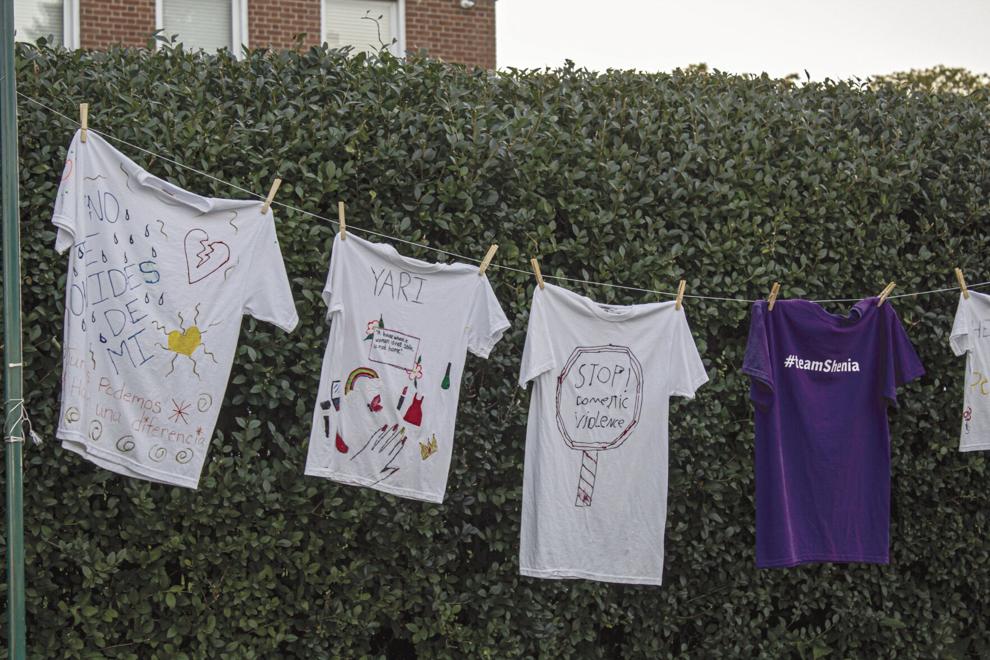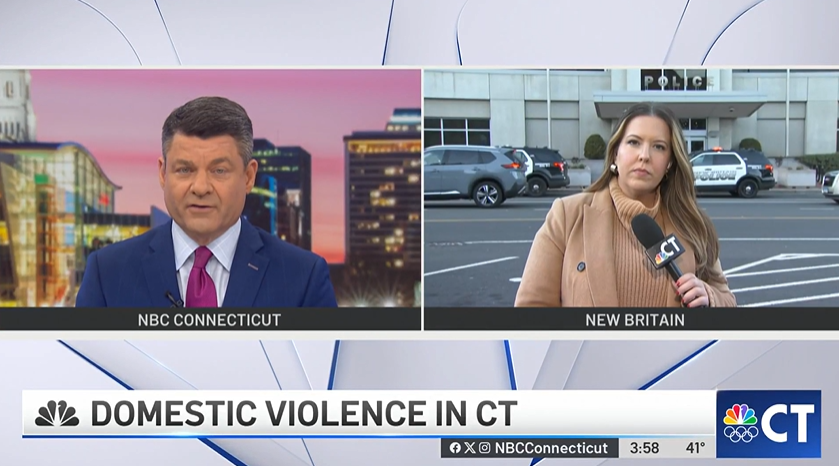
Art Exhibit Radiates Hope for Sexual and Domestic Violence Survivors
Kaily Martinez; we-ha.com; Jul. 19, 2024
The West Hartford Art League Club House Gallery held an opening reception on Thursday, July 18, for ‘The Stories of Bravery, Healing and Hope: Survivors Art Exhibition’ produced by Amanda Mendoza.
Art can connect souls in a more profound way than communication can. From July 19 through Aug. 4 at the West Hartford Art League Club House Gallery, visitors will see and feel the “Stories of Bravery, Healing and Hope: Survivors Art Exhibition” produced by artist Amanda Mendoza. At the opening reception on Thursday, July 18, the art gallery became crowded with loved ones and visitors within minutes. The support and admiration for the artists and their work could not only be seen, but it was deeply felt.
Through various mediums, such as films, photographs, poems, or oil on canvas, each artist shares their stories of how they faced sexual violence or domestic violence but are on their healing journey. Next to each art piece is a title card that presents the artist, the title and story behind each piece and details on how art has contributed to them and their healing, inspiring hope and optimism. The exhibit also featured two tables for the Prudence Crandall Center and YWCA New Britain Sexual Assault Crisis Service, where advocates provided resources and support.
Read the full story here.
Read More
Thomaston Savings Bank Awards $150K in Grants
Member News; CBIA.com; Jun. 28, 2024
Thomaston Savings Bank awarded 50 grants totaling nearly $150,000 to organizations in Hartford County. The grants are part of Phase I of the Thomaston Savings Bank Foundation’s Grant Cycle. The 48 grant recipients include nonprofit and community groups that are addressing the needs of their local communities. Applications for this round of funding were considered for organizations in Bristol, Farmington/Unionville, and New Britain.
Prudence Crandall Center is among the recipients of this grant cycle. To read the full article, click here.
Read More
Foundation Aids Eight Groups Helping Southington Residents
Michael Lemanski; Southington Patch; Jun. 11, 2024
SOUTHINGTON, CT — A regional, Bristol-based giving foundation recently awarded more than $620,000 to several Southington and Southington-area causes. According to the Main Street Community Foundation, the first cycle of 2024 grants from the Bradley Henry Barnes and Leila Upson Barnes Memorial Trust have been awarded to eight organizations. The total amount awarded is $620,448, all of which will be used to fund programs or initiatives that improve the health and well-being of Southington residents, including:
Prudence Crandall Center, Inc. in New Britain. PCC was awarded an $85,000 grant to support its comprehensive domestic violence intervention and prevention services. These programs benefitted over 230 residents of Southington last year.
The full article can be read here.
Read More
Paying It Forward: Nowakowski family’s big donation
Claudia Hilario; New Britain Herald; May 14, 2024
NEW BRITAIN — To commemorate its 50th anniversary, Prudence Crandall Center announced a special community event and significant contributions aimed at furthering its mission. From its origins in the basement of New Britain’s South Church, the Rev. Dr. Davida Foy Crabtree and local leaders laid the foundation for what has evolved into the Prudence Crandall Center today.
Read full story in the print or e-edition of The Herald.

Message in Orange: New Britain putting spotlight on Teen Dating Violence Awareness Month
Jessica Fontaine; New Britain Herald; Feb. 21, 2024
NEW BRITAIN — The Beehive Bridge will be lit in orange until Friday to raise awareness of Teen Dating Violence Awareness Month.
“All too often our teenagers experience abusive, manipulative behaviors from a person they are dating that leave them scared and unsure where to turn,” New Britain Mayor Erin Stewart said. “The city’s partnership with the Prudence Crandall Center allows us to do extremely important outreach work so that we can prevent our youth from harmful dating experiences, while also providing them with life saving resources should they find themselves in a dangerous situation.”

City addressing domestic violence
Jessica Fontaine; New Britain Herald; Jan. 9, 2024
NEW BRITAIN — Following the death of 44-year-old Sabrina Finch, who was killed in a domestic violence-related shooting on Dec. 30, the city of New Britain responded with a plan of action and resources for those experiencing domestic abuse.
Mayor Erin Stewart had a meeting Friday with Barbara Damon, executive director of the Prudence Crandall Center, the first domestic violence shelter of its kind in Connecticut. New Britain has been an active partner with the organization for several years and Stewart explained how the city is working to address domestic violence.

Murder of New Britain woman marks 15th domestic violence-related homicide in CT in 2023
Amanda Pitts; NBC CT; Jan. 2, 2024
The latest murder in New Britain marks 15 domestic violence-related homicides for the year of 2023 in Connecticut, according to the Connecticut Coalition Against Domestic Violence.
Police have charged a man with murder after a triple shooting over the weekend killed one and injured two in New Britain. Police say Antoine Harris shot and killed Sabrina Finch inside of an apartment Saturday night and also injured two others who are currently stable at the hospital. Harris was in a relationship with Finch, police added.
Her death is the second domestic violence-related homicide in the month of December in New Britain. “This murder is just another reminder of the senseless tragedy of domestic violence,” said Barbara Damon, president and CEO of the Prudence Crandall Center. “There are more people than we realize experiencing domestic violence every day.”
Damon said Finch’s death is a tragic loss for the community and was a senseless act of violence. She said there’s an increased number of people who have reached out to her organization for domestic violence services. The Prudence Crandall Center serves nearly 10,000 people a year in central Connecticut.
“It’s been very difficult to keep up with demand,” she said. “We just are struggling to keep pace to the point where we’ve had to use hotel services when the emergency shelters are full.”
Watch the NBC CT news coverage of this story here.
Read More
Beacon Prescriptions New Britain gifts Prudence Crandall Center $5K on Giving Tuesday
Jessica Fontaine; New Britain Herald; Nov. 29, 2023
NEW BRITAIN — Beacon Prescriptions New Britain presented Prudence Crandall Center with a $5,000 check on Tuesday to be used toward the nonprofit’s donor match incentive for Giving Tuesday. Beacon Prescriptions owner Todd DeGroff presented the check to the agency, which provides services to victims of domestic violence. Giving Tuesday is a global day of giving, but DeGroff’s support embodies the spirit of thinking globally and giving locally, said Carolyn Jasper, Prudence Crandall Center’s chief development officer. “Beacon Prescriptions supports many organizations and we’re fortunate to be one of them in a way that no other national pharmacy in the community does,” Jasper said.
Read the full story in the Thursday print or e edition of the Herald.

Prudence Crandall Center, Forge City Works receive $200K grants from Bank of America
Andrew Larson; Hartford Business Journal; Nov. 27, 2023
Two local nonprofits, Prudence Crandall Center and Forge City Works, will receive $200,000 grants from Bank of America as recipients of the 2023 Neighborhood Builders award for their work advancing economic mobility and helping underserved neighborhoods in Greater Hartford.
The multi-year grant is in addition to extensive leadership training to help the nonprofits, which provide domestic violence and workforce development services, respectively, expand their offerings. The Prudence Crandall Center, based in New Britain, helps survivors of domestic violence. Its emergency shelter reached 250% capacity at times during the COVID-19 pandemic. Support from Bank of America will help the group expand housing options and children’s services.
Nonprofits are selected for the Neighborhood Builders award by a committee of community leaders and past awardees. In Greater Hartford, Bank of America has selected 33 nonprofits as Neighborhood Builders, investing a total of $6.6 million in them. Bank of America’s Neighborhood Builders program is one of the largest philanthropic investments into nonprofit leadership development in the nation.
“Nonprofits are vital to solving social challenges, improving communities and promoting economic advancement across Greater Hartford,” said Joe Gianni, president, Bank of America Greater Hartford. “Providing Prudence Crandall Center and Forge City Works with flexible funding and leadership training will directly impact survivors of domestic violence in our community, fight food insecurity and create career pathways for underserved individuals.”

Prudence Crandall Center hosts candlelight vigil
Jessica Fontaine; New Britain Herald; Oct. 5, 2023
The Prudence Crandall Center (PCC) hosted a “Silent No More” Candlelight Vigil on Wednesday evening to honor those who lost their lives to domestic violence. The agency is entering its 50th year providing care to victims of domestic violence.
The vigil is sponsored by the Ryan T. Lee Memorial Foundation and music was provided by the New Britain Symphony Orchestra. Several domestic violence survivors and family members of those lost to domestic violence shared their experiences.
